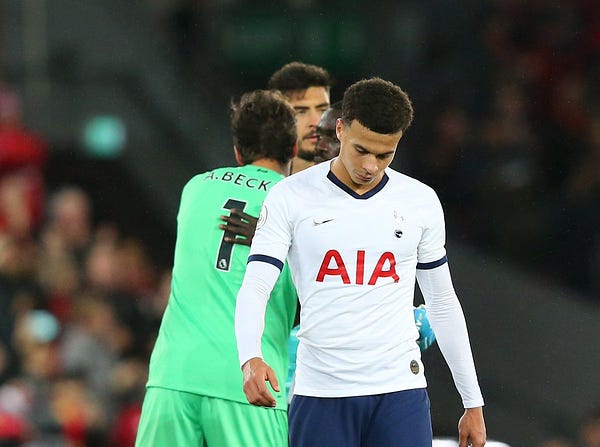As Dele Alli boarded his flight to Besiktas, he might have been forgiven for reflecting briefly on the road which led him to Turkey.
It’s a path that has seen him win the PFA Young Player of the Year award in consecutive campaigns (his first two seasons with Spurs). It’s a journey that has involved scoring the goal which took England to a World Cup semi-final for the first time in almost 30 years. It's a career that has taken Dele from a Milton Keynes housing estate to international stardom.
These facts are worth dwelling on, not least because Dele's dip in form over the last two seasons (from a point where, at 23, he had netted more Premier League goals than either Frank Lampard or Steven Gerrard had managed by the same age) has raised questions over his character.



I've written previously about the unjustified attacks on Dele's motivation but felt this did little to address the other immensely impressive attribute which is in danger of being forgotten: namely, his resilience.
Resilience has become a bit of a buzzword, so it’s worth reflecting on its meaning. The below table, taken from Mustafa Sarkar and Abigail E. Page’s ‘Developing Individual and Team Resilience in Elite Sport: Research to Practice’, provides a helpful snapshot of what the term should and should not denote.
Dele’s experiences immediately bring to mind a couple of points in the top four rows of the table. This is a player who scored the deciding goal in his country’s biggest game for almost three decades. His ability to use ‘personal qualities’ - such as self-confidence or competitiveness - to withstand pressure, has been evidenced on the most high-profile of stages.
Away from international football, Dele’s club career should also serve as a reminder that resilience is a ‘dynamic process, resulting from the interaction of an individual and his or her environment.’ After spending four years under the wings of Mauricio Pochettino, a manager renowned for nurturing young players and instilling a positive culture at the clubs he’s taken charge of, Dele has played for five coaches in a shade less than three seasons.
If we view resilience as a ‘context-specific capacity’ - or a trait that’s influenced by what goes on around us - there’s surely little debate that Dele’s ability to withstand pressure will have been affected to some degree by the different training methods, playing styles, tactics, physical and mental support he’s had access to since 2019.
A look at the quadrant below, which features as part of Sarkar and Page’s research, offers an illustration of the change which Dele might have experienced. During his first four campaigns with Tottenham, we could reasonably hypothesize that he was part of a ‘facilitative environment’.
He was a pivotal member of what was arguably Spurs’ greatest squad of modern times, consistently challenging for domestic and European honours. The team and backroom staff were settled, with Pochettino’s post-match interview in Amsterdam (following Tottenham’s Champions League semi-final win against Ajax) encapsulating the emotional bond between the manager and players.
In other words, Dele was part of a group that was both ‘challenged’ - with high expectations of one another, instilling accountability and responsibility - and ‘supported’, enabling people to develop their personal qualities, and helping to promote learning and build trust.
In the years which followed Pochettino’s departure, were Dele and his teammates ‘supported’ to the same degree? This isn’t a question designed to pin blame on any of the coaching teams Spurs employed between 2019 and Antonio Conte’s arrival, but rather to draw attention to the fact that hiring four managers (if you include Ryan Mason) in a little under three years surely makes it harder to foster qualities such as trust.
Dele’s departure from Everton drew a predictable cacophony of lazy soundbites, referencing personal characteristics and psychological skills without any real justification. As he starts the next chapter of what’s already a stellar career, let’s hope that a break from English football provides one of the country’s brightest sporting talents with some well-earned respite.






Would be amazing to witness a comeback from Dele Alli, though I do wonder if Besiktas itself is a place where he can be provided with the facilitative environment he experienced under Poch. Certainly a needed break from the limelight that hopefully allows him to relaunch his career.